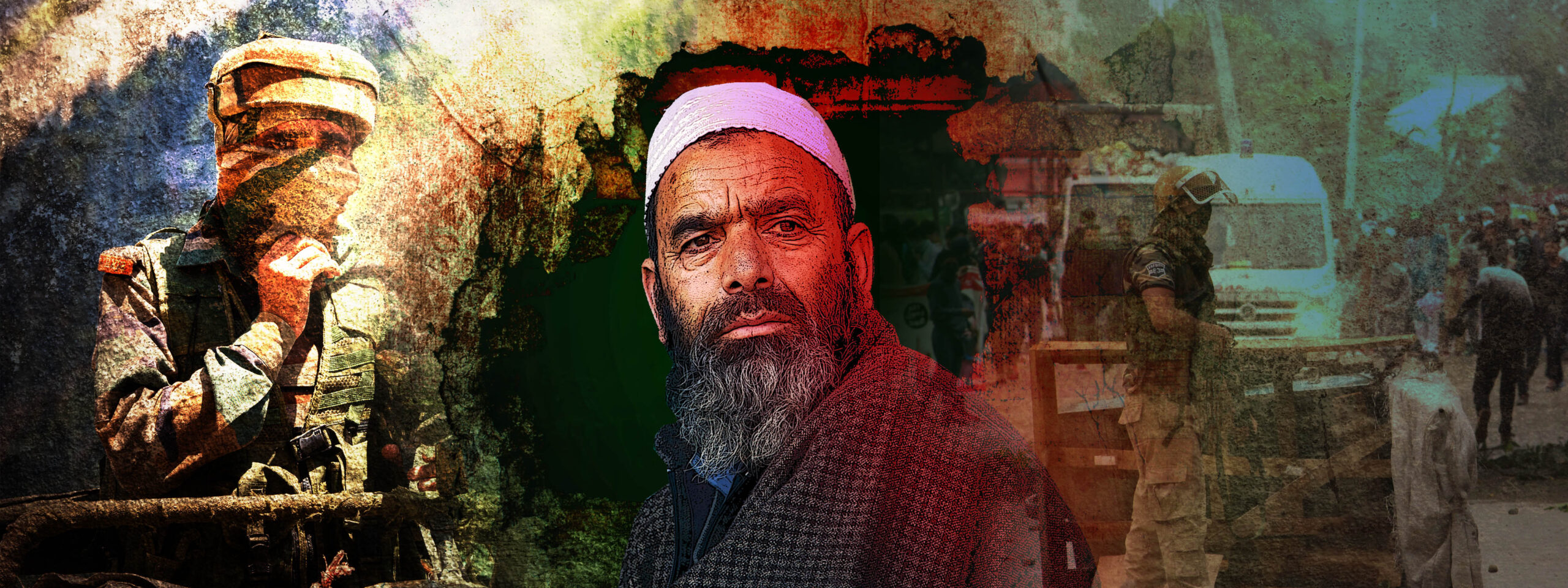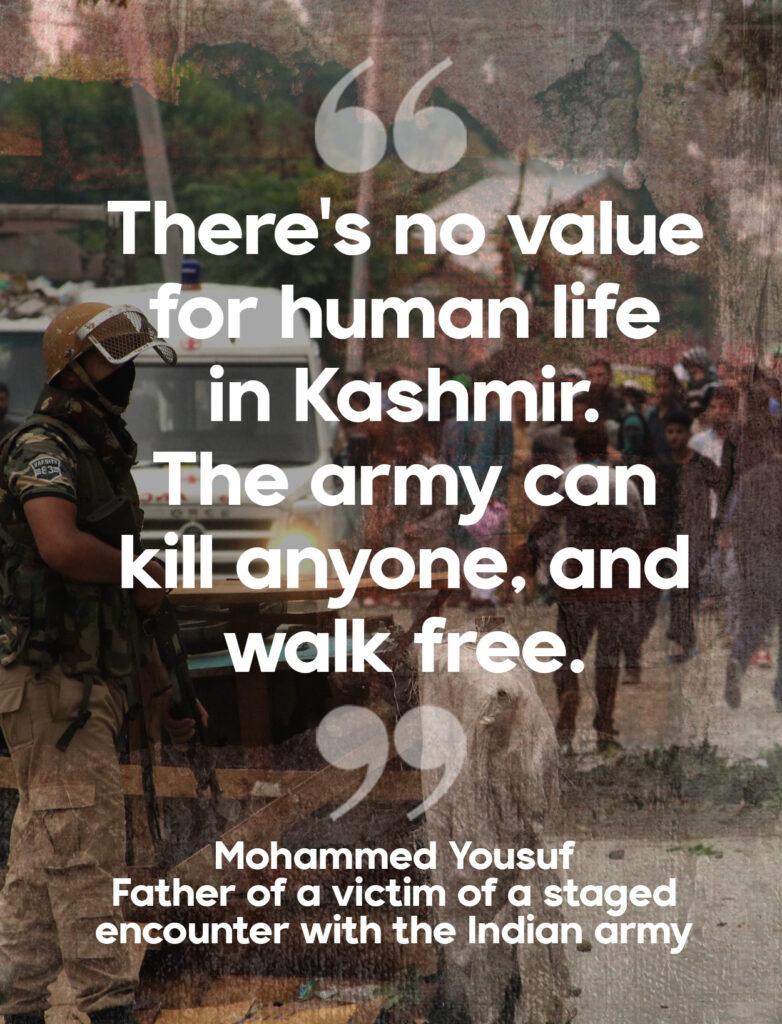|
Getting your Trinity Audio player ready...
|
Trigger warning: This article contains a graphic image.
F
ear hung heavily over Topa Peer, an impoverished village perched atop a mountain and surrounded by a thick forest in Poonch district of Indian-administered Jammu & Kashmir. A stranger’s arrival could put the locals on edge, and children and adults alike moved mechanically and quickly whenever new faces passed through the village’s alleys.
Outside his home, however, 60-year-old Nazir Hussain was oblivious to everything, absorbed as he was in his grief over the recent death of his son.
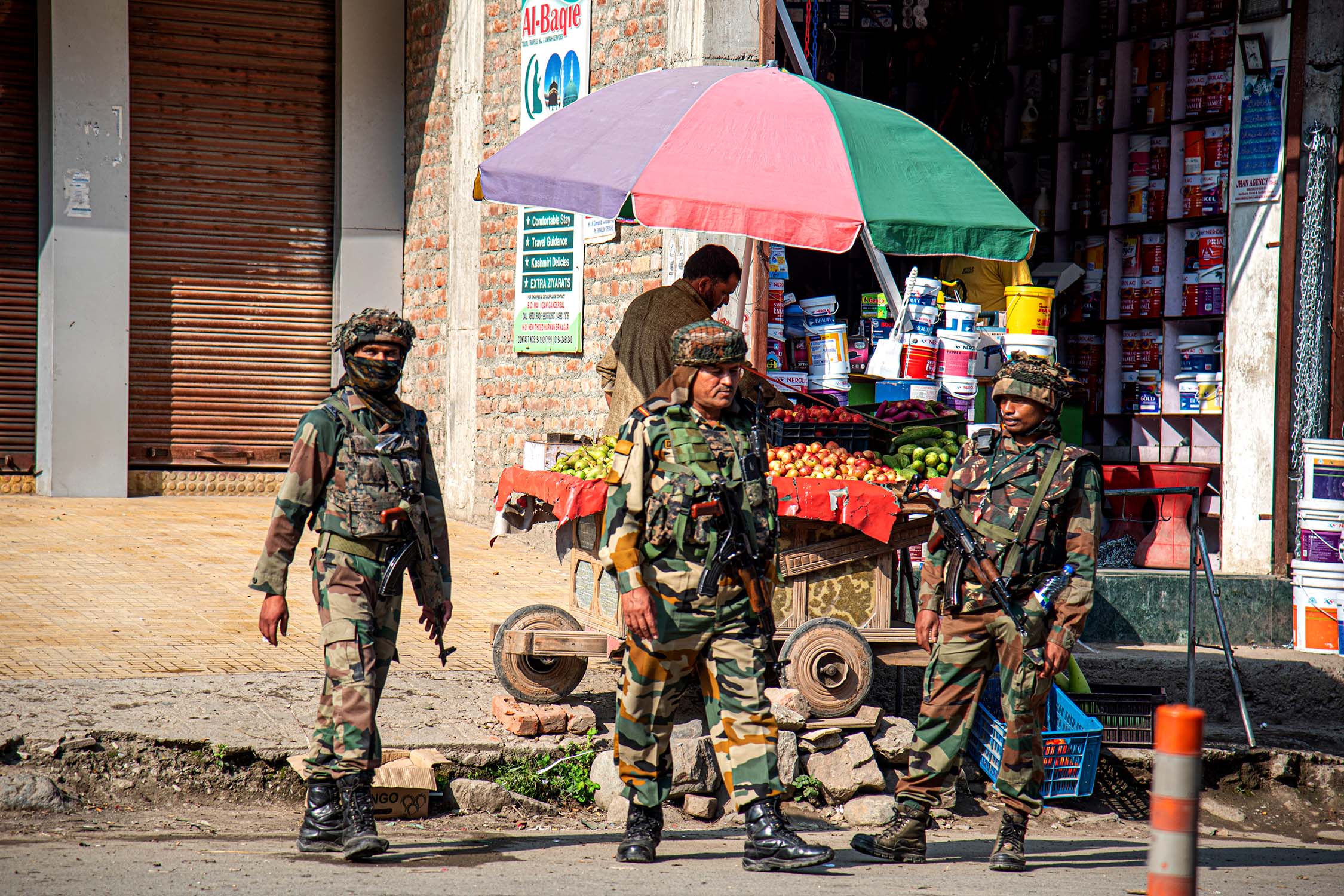
After an ambush by anti-India militants killed soldiers near Topa Peer on Dec. 22, 2023, soldiers from the counterinsurgency unit Rashtriya Rifles (RR) detained 9 villagers, including Nazir Hussain’s 26-year-old son, Mohammed Showkat.
“They took us to their camp, where over 40 army men took turns to beat us with sticks,” recalled Lal Hussain, an eyewitness and one of the nine civilians picked up by the army from Topa Peer that day. “I was hit only once, but they kept on beating others for hours, without even stopping once.”
A video that went viral on social media showed men in camouflage sprinkling chili powder on the private parts of the Topa Peer villagers. Of the nine, three – among them Showkat – did not survive the five hours of torture, verbal abuse, and degradation.
“When we gave him the final bath, every part of his body had torture marks,” said Nazir Hussain, referring to the last ritual wash for his son before burial. “Some details of the torture on his body are too gruesome and painful to recount.”
Showkat was not the only one who had severe torture signs on his body. A cousin of 45-year-old Safeer Hussain, another of the three fatalities, recounted: “Right from the heel to the neck, his body had clear signs of torture, including a completely broken neck. His arms had puncture wounds, as if he had been subjected to electric shocks. The beatings had left the backside entirely black.”
The photos and videos accessed by Asia Democracy Chronicles of the bodies of the three civilians substantiate the claims of the Topa Peer families. Yet no one among those ADC interviewed believed anyone would eventually be held responsible for the abduction of the villagers, much less the deaths.
The dismantling of rights groups, both state and non-state, had plunged the region into an oppressive silence. Arrests and intimidation had effectively muzzled rights advocates, leaving little hope that this would be the last such incident.
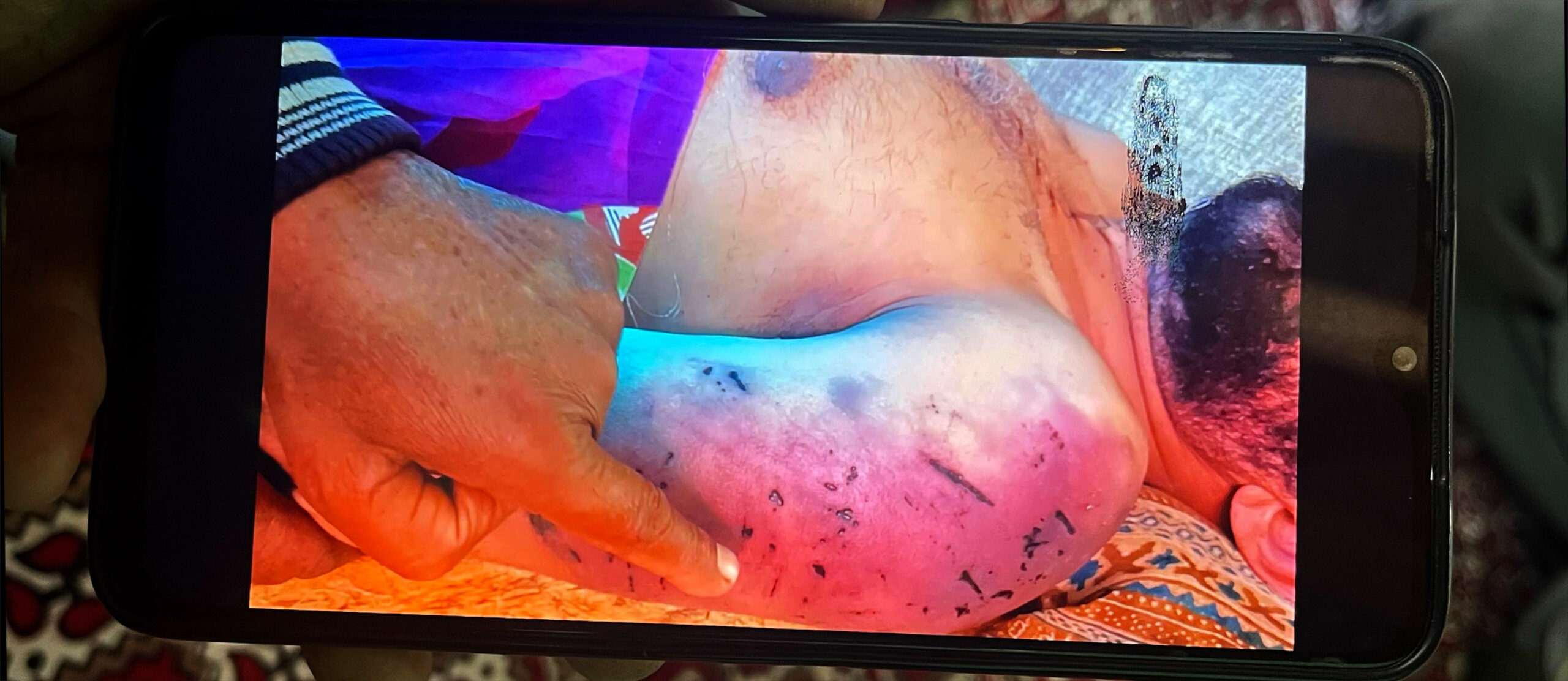
No one to record crimes
Kashmir, where security forces operate with legal impunity, desperately needs strong human rights groups. But when Prime Minister Modi’s Bharatiya Janata Party (BJP) government revoked Kashmir’s special status and statehood on Aug. 5, 2019, it also dissolved one of its seven key commissions: the State Human Rights Commission (SHRC).
Kashmir’s transition to a Union territory left at least 8,000 human rights violation cases pending with the defunct SHRC. Even though such cases now fall under the purview of the National Human Rights Commission (NHRC) in New Delhi, the body accommodates only those filed after Aug. 5, 2019, leaving the fate of these earlier cases uncertain.
Khurram Parvez, a human rights activist in Kashmir, told HuffPost in 2019 that some of the big cases, like unidentified mass graves and enforced disappearances, were among the pending ones.
“After many years of denial, the government had started submitting reports,” Parvez said. “Now the point is, will NHRC show the same seriousness toward these cases?”
There were other major setbacks: the National Investigation Agency, India’s counter-terrorism agency, raided the Jammu & Kashmir Coalition of Civil Society (JKCCS), effectively silencing a key human rights group in the region. Its program coordinator, Parvez, was arrested and remains in detention.
Following Parvez’s 2021 arrest on “terrorism” charges, a majority of JKCCS members have either left the organization or chosen to go silent. Other groups that collaborated with JKCCS in documenting cases of human rights violations are now also laying low and keeping quiet.
“To send a message, the state always uses scapegoats,” said a Kashmiri lawyer turned academic. “That’s why, to disband the narrative of ‘rights violations’ in Kashmir, the state directly disbanded JKCCS. After 2019, India aimed to wipe out evidence of human rights abuses in Kashmir by delegitimizing JKCCS. Now, that same fear prevents anyone in Kashmir from documenting such crimes.”
The academic added: “What happened with JKCCS and other human rights organizations in Kashmir clearly means that the last avenues of justice may have also closed, allowing the impunity of the armed forces to know no limits.”
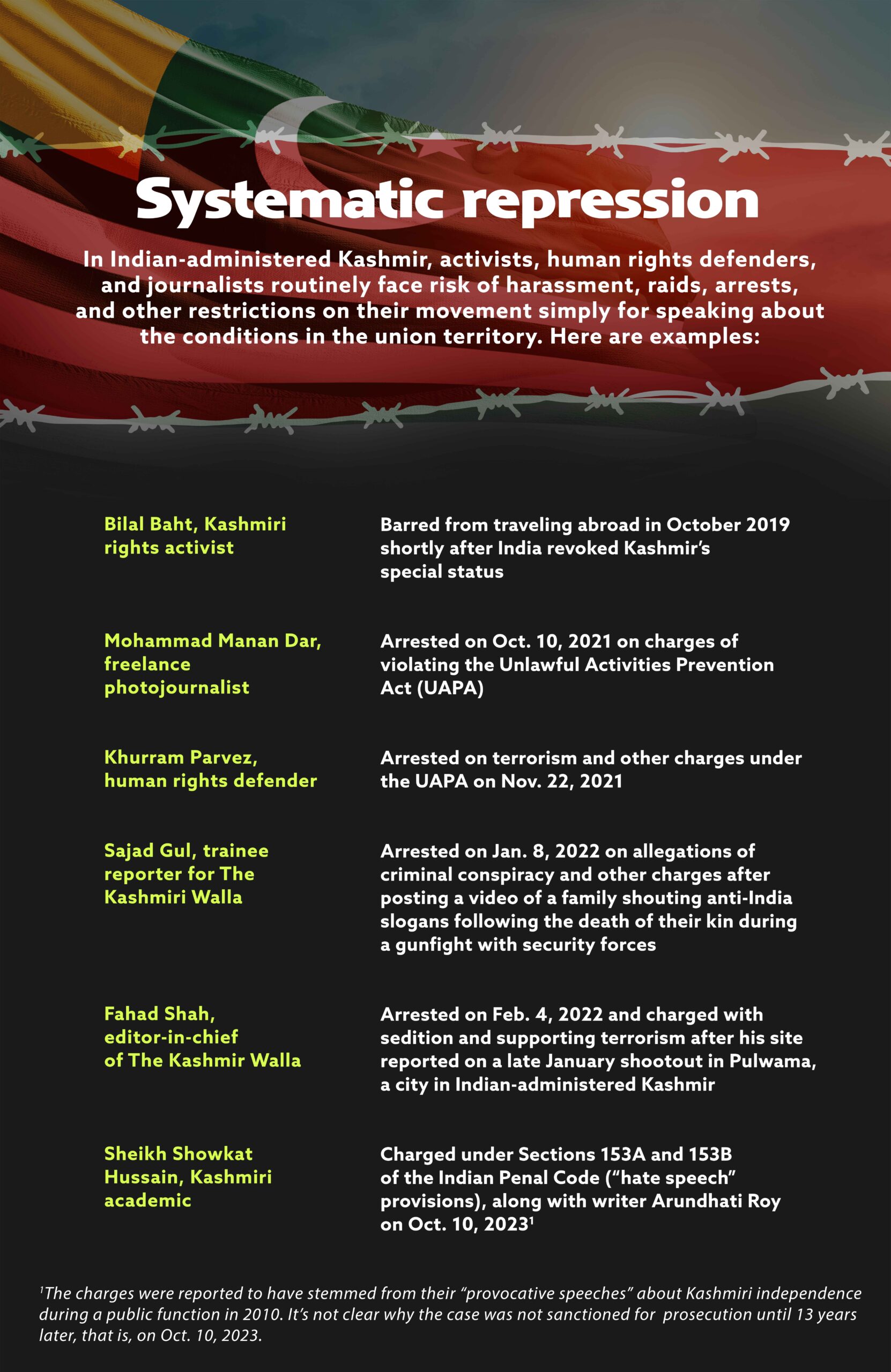
Lethal ‘special powers’
In the early 1990s, Kashmir had witnessed a popular armed uprising, with thousands of separatist fighters demanding an independent Kashmir or the region’s merger with Pakistan. To control the rebellion, the Indian government implemented the Armed Forces Special Powers Act (AFSPA) in Jammu and Kashmir, declaring it as a “disturbed area.”
The act granted the Indian armed forces power to impose warrantless detentions and searches on individuals. Locals and rights groups were especially outraged by armed forces who seemingly interpreted justice as a license to brutalize suspected state enemies, escaping any civilian accountability.
One activist noted, “A key provision of AFSPA is the sweeping empowerment of individuals from the police and the military and the paramilitary to open fire, if he is [sic] of the opinion that it is necessary to do so for the maintenance of public order.”
To the Kashmiri lawyer turned academic, the military’s ability to act with impunity in violating human rights stems from tacit government approval. “When scrutinizing cases of torture and killings in Kashmir, you’ll find a certain level of approval from the government,” said the scholar. “The Indian military, on its own, cannot carry out such actions without civilian government approval. Hence, in Kashmir, impunity for the armed forces is essentially a public policy of the state.”
When Kashmiris were still able to turn to them for aid and support, rights advocates and institutions recorded huge numbers of abuses allegedly by the armed forces in the region.
For instance, a 2015 report by the International Peoples’ Tribunal on Human Rights and Justice in Indian-Administered Kashmir (IPTK) and the Association of Parents of Disappeared Persons (APDP) detailed 333 cases of rights violations, with at least 415 civilian deaths and 89 enforced disappearances from 1989 to June 2015. (The 2015 report is the latest from IPTK and APDP.)
It also named some 972 alleged perpetrators, among them 464 army personnel, 161 paramilitary personnel, 158 Jammu and Kashmir Police personnel and 189 “government gunmen.”
A 2015 Amnesty International report meanwhile said that there were more than 800 cases of torture and death in the custody of army and other security forces in the 1990s, and hundreds of other cases of extrajudicial executions and “enforced disappearances” between 1989 to 2013.
A 2019 report by JKCCS and APDP that scrutinized 432 torture cases in the valley also said that most of the over 600 perpetrators were members of security forces.
Investigations into the majority of these torture cases are still pending while probes of most of the cases covered by the 2015 IPTK and APDP report remain incomplete. Worse, no one has been held responsible for the crimes.
Observed the writers of the report: “Despite overwhelming evidence, the Indian judiciary and executive [supported by the legislature through laws such as AFSPA] do not allow for fair and independent processes of investigation or prosecution.”
Justice denied
Back in Topa Peer, the six villagers who survived the December 2023 abduction and torture are still waiting for their day in court. Amid public outrage, the six survivors were moved from the army camp to a military hospital where they underwent treatment for two weeks.
Jammu and Kashmir Police filed a First Information Report (FIR) charging “unknown” individuals with murder, but two months after the killings, the case has not moved.
“The army won’t give any justice,” said 60-year-old Wali Mohammed, father of Shabir Ahmed, 30, the third fatality in the December 2023 incident. “I might never find out who took my son’s life and why.”
According to a Supreme Court advocate, the rules the Indian military follows to prosecute its own members are not entirely transparent.
“The protections given to armed forces in conflict zones must not extend to such an extent that they make a mockery of the law,” the advocate told ADC. “Any crime should be regarded as such and prosecuted under criminal law. But AFSPA precisely protects these kinds of offenders [armed forces], and thus victims are not able to get justice.”
The advocates stressed that AFSPA is a poor reflection of systems in India, adding, “It sends a message [to the armed forces] that ‘you’re free to do whatever you want to do.’”
Last year, though, some Kashmiris thought things were finally working their way. In March 2023, an army court in India sentenced an Indian army captain to life imprisonment for abducting three civilians in South Kashmir’s Shopian district and murdering them in a staged gunfight on July 18, 2020.
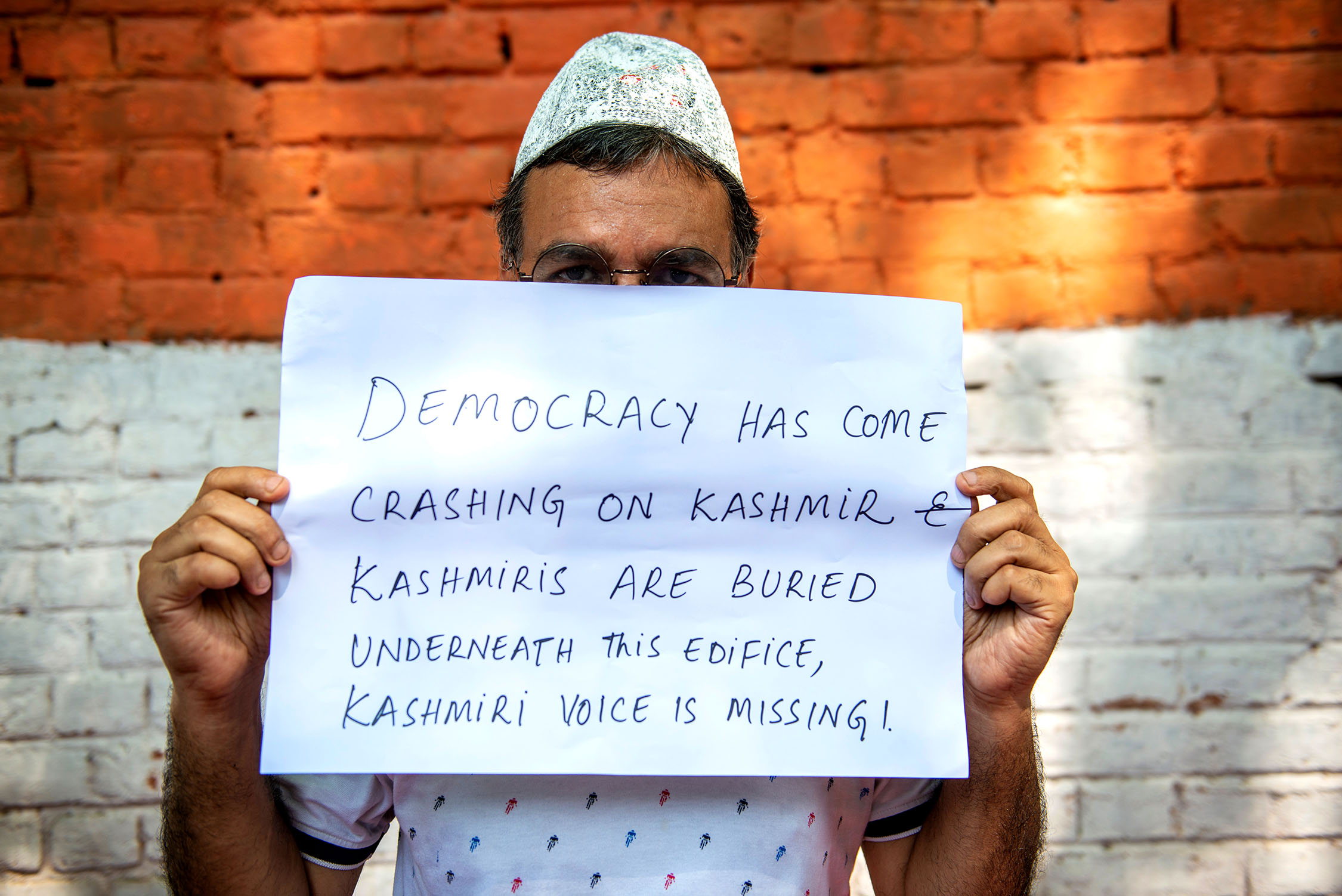
Within eight months of the sentence, however, an Armed Forces Tribunal suspended the captain’s life term and granted him bail.
“Even though the accused had confessed to his crimes, he was still let go,” said 65-year-old Mohammed Yousuf, father of 25-year-old Mohammed Ibrar, one of the three killed in the fake encounter. “There’s no value for human life in Kashmir. The army can kill anyone, and walk free.” ◉










